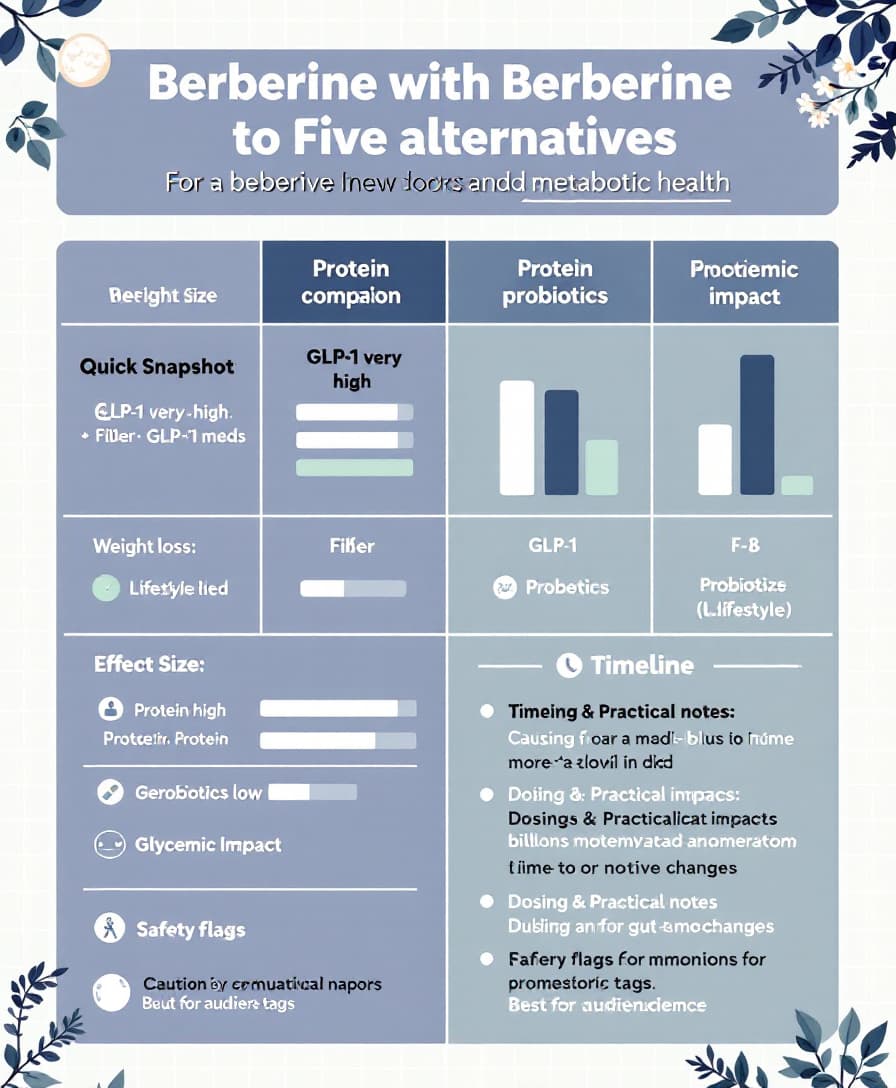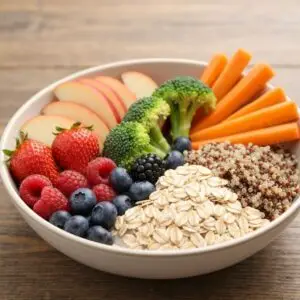Is Berberine the Plant-Based Solution to Weight Loss? Comparing “Nature’s Ozempic” to 5 Alternatives
Medical Disclaimer: This article is for informational purposes only and does not constitute medical advice. Always consult with a qualified healthcare professional before making any decisions about your health or treatment, especially regarding supplements, medications, or significant lifestyle changes. The information provided here is not intended to diagnose, treat, cure, or prevent any disease.
“Nature’s Ozempic” sounds bold. The truth is simple: Berberine can support modest weight loss when paired with a healthy diet and exercise, but it is not a substitute for Ozempic. Berberine is a plant-derived alkaloid that activates AMPK, a cellular energy sensor tied to glucose use and lipid balance. Early studies indicate small reductions in body weight and waist circumference, with more pronounced effects on blood sugar and cholesterol levels.
In this comprehensive guide, we compare berberine to five alternatives: GLP-1 medications (such as Ozempic), fibre-based strategies, protein prioritization, probiotics, and lifestyle stacks.
We share benefits, limits, evidence-based dosing, safety considerations, and clean-eating tips.
You will gain a practical view that supports sustainable weight management and metabolic health.
If you value credible guidance on berberine benefits, plant-based weight loss, and alternatives to Ozempic, you’re in the right place. We cite high-quality sources and share preferred-source tips for readers in the US and India.
At the end, join our free weekly newsletter for evidence-based tips, and follow us on Instagram, Pinterest, X, and Facebook for daily support.
What is Berberine? Mechanism, Benefits, and Limits
What it is
Berberine is a bioactive compound found in various plants, including Berberis vulgaris (barberry) and Coptis chinensis (goldenseal). It has been extensively studied for its potential metabolic support, particularly concerning blood sugar regulation, lipid balance, and insulin sensitivity. Many consider it a natural weight loss supplement due to its metabolic effects.
How it works (simple view)
Berberine primarily exerts its effects by activating Adenosine Monophosphate-Activated Protein Kinase (AMPK), often referred to as a “master regulator” of metabolism. This activation helps cells use glucose more efficiently, supports fat metabolism, and can reduce the liver’s glucose output. These mechanisms contribute to its potential for modest weight management and improved metabolic health.
Evidence highlights
Clinical trials and meta-analyses consistently show that berberine can significantly improve markers like fasting glucose, A1C, triglycerides, and LDL cholesterol [3, 4]. While its impact on weight loss is generally modest, some studies in overweight adults have reported average losses of about 1–2 kg over several months when combined with diet and physical activity [5]. The strongest evidence for berberine lies in its positive effects on glycemic and lipid markers, rather than dramatic weight reduction.
Benefits we can expect
•Modest Weight Support: When combined with a healthy diet and regular exercise, berberine can offer support for weight management.
•Improved Glucose Control: It helps in achieving better fasting glucose levels and post-meal blood sugar regulation.
•Lipid Balance: Berberine contributes to improved triglyceride and LDL cholesterol levels, with some studies noting small increases in HDL cholesterol.
•Fatty Liver Support: There is emerging evidence suggesting its role in supporting markers related to non-alcoholic fatty liver disease (NAFLD).
Limits and caveats
•Not a GLP-1 Agonist: It is crucial to understand that berberine is not a GLP-1 receptor agonist, and its effects are not comparable in magnitude to prescription medications like Ozempic or Wegovy.
•Digestive Side Effects: Higher doses of berberine can lead to gastrointestinal side effects such as nausea, cramping, and diarrhea.
•Quality and Interactions: The quality of berberine supplements varies widely. Potential interactions with other medications are possible, necessitating professional guidance.
High-authority references for Berberine
Berberine vs. 5 Alternatives for Weight Management

A visual comparison of Berberine and various weight loss strategies, highlighting their mechanisms, effectiveness, and practical considerations.
4.1 GLP-1 medications (Ozempic/Wegovy)
What they are: Glucagon-like peptide-1 (GLP-1) receptor agonists are a class of prescription medications that mimic the effects of natural GLP-1 hormones. They enhance satiety, slow gastric emptying, and improve insulin secretion in a glucose-dependent manner. These drugs are approved for the treatment of type 2 diabetes and, in some formulations (e.g., Wegovy), for chronic weight management [6].
Effectiveness: GLP-1 medications are highly effective for weight loss, with average reductions significantly greater than most supplements. Clinical trials for semaglutide (Wegovy) have shown participants achieving 10–15% or more body weight loss over 68 weeks [7]. They also provide robust glycemic control for individuals with type 2 diabetes.
Pros: Offers substantial weight loss and excellent glycemic control. Some agents have demonstrated cardiovascular benefits. Their use is prescribed and closely monitored by healthcare professionals.
Cons: High cost and potential access issues. Common side effects include nausea, vomiting, diarrhea, and constipation. There’s also a possible risk of gallbladder issues. Continuous use is often necessary to maintain the weight loss and metabolic benefits.
Where berberine fits: Berberine is not a substitute for GLP-1 medications. However, it may serve as a complementary agent or an alternative for individuals not using GLP-1s, with appropriate clinician approval, to support metabolic markers.
References:
•FDA label, semaglutide
•New England Journal of Medicine (NEJM) semaglutide trials
4.2 Fibre-based strategies
What they are: Fibre-based strategies involve increasing the intake of soluble and viscous fibres from whole foods and supplements like psyllium, glucomannan, or inulin. These fibres absorb water, forming a gel-like substance in the digestive tract.
Effectiveness: Dietary fibre supports satiety, helps stabilize blood sugar levels, and promotes a healthy gut microbiome. Meta-analyses indicate that increased fibre intake can lead to modest weight support, particularly when integrated into a calorie-aware eating plan.
Pros: A food-first approach that is generally well-tolerated. It aids in cholesterol management and promotes regular bowel movements. Fibre-rich foods are integral to clean eating principles.
Cons: Requires consistent intake and adequate hydration. Rapid increases in fibre can lead to gastrointestinal discomfort, such as gas and bloating.
Where berberine fits: Berberine and viscous fibre are highly complementary. Berberine targets glucose and lipid metabolism, while fibre enhances fullness and supports cholesterol levels.
A practical approach is to start with 5–10 g/day of added soluble fibre and gradually increase to 15–20 g/day if tolerated. The overall daily target from food should be 25–38 g/day.
References:

4.3 Protein prioritization
What it is: Protein prioritization involves ensuring sufficient protein intake throughout the day to promote satiety, preserve lean muscle mass, and support metabolic function. This strategy is fundamental for effective weight loss and body composition improvement.
Effectiveness: Adequate protein intake is well-documented to enhance appetite control, reduce cravings, and support fat loss, especially when combined with resistance training.
A practical target for most adults is 1.2–1.6 g of protein per kilogram of body weight per day, distributed across meals.
Pros: Significantly improves feelings of fullness and helps maintain lean body mass during weight loss. It pairs exceptionally well with strength training programs to build or preserve muscle.
Cons: Requires conscious meal planning and preparation to meet daily targets. Individuals with pre-existing kidney disease should seek medical guidance before significantly increasing protein intake.
Where berberine fits: Berberine can complement protein prioritization by helping to manage post-meal glucose spikes. Pairing berberine with protein-rich and fibre-rich meals can further reduce blood sugar fluctuations and curb cravings, contributing to better overall metabolic control.
References:
•International Society of Sports Nutrition (ISSN) position stands on protein.

4.4 Probiotics and gut support
What they are: Probiotics are live microorganisms that, when administered in adequate amounts, confer a health benefit on the host. Specific probiotic strains and fermented foods (e.g., yogurt, kefir, and kimchi) are thought to influence gut microbiota composition, which in turn may affect appetite signals, energy metabolism, and insulin sensitivity.
Effectiveness: The impact of probiotics on weight management is strain-specific and generally modest. Some research indicates that certain strains may lead to small reductions in body weight and waist circumference, but results can vary significantly between individuals and products. It is not considered a standalone solution for significant weight loss.
Pros: Supports overall gut comfort and digestive health, which can indirectly aid adherence to a healthy eating plan. Fermented foods also provide additional micronutrients and bioactive compounds.
Cons: Inconsistent results across different probiotic products and strains. The scientific evidence is still evolving, and it should not be relied upon as a primary weight loss intervention.
Where berberine fits: Berberine has been shown to modulate the gut microbiome, potentially enhancing the benefits of probiotics. Combining berberine with prebiotic fibre (which feeds beneficial gut bacteria) and a diet rich in fermented foods can create a synergistic effect for gut health and metabolic support.
References:
•Reviews on gut microbiome and weight.

4.5 Lifestyle stacks (sleep, steps, strength, stress)
What they are: A “lifestyle stack” refers to a synergistic combination of fundamental healthy behaviours that collectively support weight management and overall well-being. Key components include adequate sleep (7–9 hours), consistent physical activity (e.g., 8–12k steps daily), regular strength training (2–3 sessions weekly), and effective stress management techniques.
Pros: Low-cost, high-impact strategies that improve not only physical health but also energy levels, mood, and cognitive function. They are sustainable and form the bedrock of any successful weight management plan.
Cons: Requires consistent planning, tracking, and self-discipline. Progress may feel slower compared to pharmaceutical interventions, but the results are often more enduring.
Where berberine fits: Berberine acts as a supportive layer to these essential lifestyle practices. While the lifestyle stack is the primary engine for sustainable health, berberine can provide additional metabolic support, particularly for glucose and lipid management, enhancing the overall effectiveness of these habits.
References:
•NIH National Heart, Lung, and Blood Institute (NHLBI) on sleep health

Dosing, Timing, and Practical Use of Berberine
Typical berberine dose
For metabolic support and modest weight management, the typical dosage of berberine is 500 to 1,500 mg per day, divided into two or three doses and taken with meals. It is recommended to start with a lower dose, such as 500 mg once daily, and gradually increase as tolerated.
Timing tips
Taking berberine with meals is crucial to minimize gastrointestinal (GI) upset, which is a common side effect. If cramping, loose stools, or other GI issues occur, reduce the dosage for a week before attempting to increase it again.
Quality and form
Always choose third-party tested brands to ensure product purity and potency. Look for certifications such as USP, NSF, or Informed Choice marks. Opt for standardized berberine HCl, and initially, keep formulas simple to assess individual response.
Stacking with food strategies
Maximize berberine’s benefits by pairing it with high-fibre, high-protein meals. Simultaneously, limit refined carbohydrates and liquid calories, and ensure adequate hydration throughout the day.
Who might benefit
Individuals with insulin resistance, prediabetes, or dyslipidemia (imbalanced cholesterol/triglyceride levels) may observe more significant changes in laboratory markers than on the scale. Berberine can be a plant-based option for those not using GLP-1 medications, always with the approval and guidance of a healthcare professional.
Safety, Side Effects, and Interactions of Berberine
Common side effects
The most common side effects associated with berberine include nausea, abdominal cramping, diarrhea, constipation, and headache. These are typically dose-related and can often be mitigated by starting with a low dose and increasing gradually, or by taking it with food.
Interactions
•Diabetes medications: Berberine can lower blood sugar, increasing the risk of hypoglycemia when taken with diabetes medications (e.g., insulin, metformin, sulfonylureas). Close monitoring by a clinician is essential.
•Blood thinners and antihypertensives: Possible interactions exist with blood-thinning medications (e.g., warfarin) and antihypertensive drugs, potentially altering their effects. Seek guidance from a healthcare professional.
•CYP and P-gp interactions: Berberine can affect cytochrome P450 (CYP) enzymes and P-glycoprotein (P-gp), which are involved in the metabolism and transport of many drugs. This can alter the effectiveness or increase the side effects of various medications. Consult a pharmacist or physician for a comprehensive review of potential interactions.
Who should avoid or use with guidance?
•Pregnancy and breastfeeding: Berberine is generally not recommended during pregnancy or breastfeeding due to insufficient safety data.
•Liver or kidney issues: Individuals with pre-existing liver or kidney conditions should only use berberine under strict physician approval and supervision.
•Surgery: Discontinue berberine supplements 1–2 weeks before any scheduled surgery unless otherwise advised by a medical professional.
Best practice
Before starting berberine, obtain baseline laboratory tests, including fasting glucose, A1C, a complete lipid panel, and liver enzymes (ALT/AST). Retest these markers in 8–12 weeks to assess efficacy and safety. Maintain a simple log of your habits, symptoms, and any changes experienced.
References:
Frequently Asked Questions (FAQs) about Berberine and Weight Loss
Is berberine “Nature’s Ozempic”?
No. While berberine can support modest weight loss and improve glucose and lipid metabolism, its mechanism and effect size do not match those of GLP-1 receptor agonists like Ozempic. It is a complementary tool, not a direct replacement.
How long until changes from berberine are noticeable?
Gastrointestinal adaptation typically occurs within 1–2 weeks. Noticeable shifts in laboratory markers (blood sugar, lipids) may be observed in 8–12 weeks. Any weight changes, if they occur, are generally gradual and require consistent use alongside lifestyle modifications.
Can I take berberine with fibre or probiotics?
Yes, berberine can be taken with fibre and probiotics. It is advisable to introduce one new supplement or dietary change at a time and increase slowly to minimize potential GI issues. Always consult with your clinician, especially if you are taking other medications.
What if I only want lifestyle changes for weight management?
Focusing solely on lifestyle changes is an excellent and highly effective approach. Prioritize optimizing sleep quality, increasing daily steps, incorporating regular strength training, and implementing effective stress management techniques. Consider adding soluble fibre and targeting adequate protein intake before introducing any supplements.
Does the quality of berberine supplements matter?
Absolutely. The quality of berberine supplements is critical. Always opt for standardized berberine HCl from third-party tested brands that carry certifications such as USP, NSF, or Informed Choice marks to ensure purity, potency, and absence of contaminants.
Bottom Line: Berberine’s Role in Sustainable Weight Management
Berberine offers a compelling plant-based option that provides modest support for weight loss and more reliably improves blood sugar and lipid profiles. It is not a replacement for powerful GLP-1 medications but rather a valuable adjunct. The most significant and sustainable results are achieved when berberine is integrated into a holistic approach that includes a robust lifestyle stack, higher fibre intake, and protein-forward meals.
If you are seeking a non-prescription tool for metabolic support and your clinician agrees it is appropriate for you, start with a low dose, increase slowly, and diligently track your response. For individuals pursuing more aggressive weight loss goals, a discussion with your doctor about GLP-1s, combined with the same healthy habits, is recommended.
Preferred Sources for our US and India Readers
To ensure you receive the most credible and relevant health information, we recommend adding us to your Google Preferred Sources list. This feature, available in the US and India for now, allows you to customize your news experience in Google Search to see more posts from us. Simply search for a topic, click the icon next to “Top Stories,” and select our website as your preferred source.
Institutional References
•[1] NIH Office of Dietary Supplements (ODS) on botanicals
•[2] Lee, Y. S., et al. (2006). Berberine, a natural plant product, activates AMP-activated protein kinase with beneficial metabolic effects in diabetic and obese db/db mice. Diabetes Journal, 55(8), 2256-2264.
•[3] American Diabetes Association (ADA) Standards of Care.
•[4] Cleveland Clinic
•[5] Lan, J., et al. (2015). Meta-analysis of the effect and safety of berberine in the treatment of type 2 diabetes mellitus, hyperlipemia, and hypertension. Journal of Ethnopharmacology, 161, 69-81.
•[6] FDA label, semaglutide (Ozempic/Wegovy):
•[7] Wilding, J. P. H., et al. (2021). Once-Weekly Semaglutide in Adults with Overweight or Obesity. New England Journal of Medicine, 384(11), 989-1002.
•[8] Harvard T.H. Chan School of Public Health on fibre
•[9] Sattar, N., et al. (2015). Viscous fibre for weight loss in overweight and obese adults. Cochrane Database of Systematic Reviews, (1).
•[10] Jäger, R., et al. (2017). International Society of Sports Nutrition Position Stand: protein and exercise. Journal of the International Society of Sports Nutrition, 14(1), 20.
•[11] Paddon-Jones, D., et al. (2015). Protein and exercise: a review of the current evidence and recommendations for optimal protein intake. American Journal of Clinical Nutrition, 101(6), 1320S-1329S.
•[13] Centers for Disease Control and Prevention (CDC) Physical Activity Guidelines:
•[15] NIH National Heart, Lung, and Blood Institute (NHLBI) on sleep health:
•[16] NIH LiverTox
•[17] National Center for Complementary and Integrative Health (NCCIH):
Join us- Subscribe Today…!
•Subscribe to Our Free Weekly Newsletter: Get step-by-step guides, grocery lists, and the latest research updates delivered directly to your inbox. Subscribe Here!
•Follow Us for Daily Tips & Recipes: Connect with our community and get daily inspiration for a healthier lifestyle:
Explore more topics like:
• High-Fibre Grocery Guide





